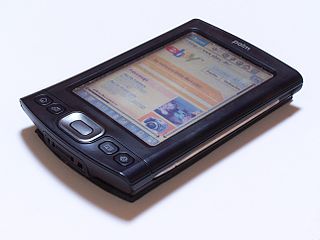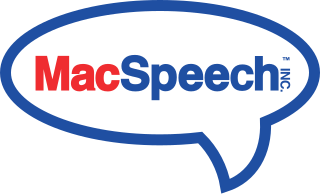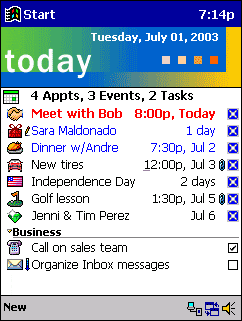
A personal digital assistant (PDA) is a multi-purpose mobile device which functions as a personal information manager. Following a boom in the 1990s and 2000s, PDA's were mostly displaced by the widespread adoption of more highly capable smartphones, in particular those based on iOS and Android in the late 2000's, and thus saw a rapid decline.
JavaOS is a discontinued operating system based on a Java virtual machine. It was originally developed by Sun Microsystems. Unlike Windows, macOS, Unix, or Unix-like systems which are primarily written in the C programming language, JavaOS is primarily written in Java. It is now considered a legacy system.
PlainTalk is the collective name for several speech synthesis (MacinTalk) and speech recognition technologies developed by Apple Inc. In 1990, Apple invested a lot of work and money in speech recognition technology, hiring many researchers in the field. The result was "PlainTalk", released with the AV models in the Macintosh Quadra series from 1993. It was made a standard system component in System 7.1.2, and has since been shipped on all PowerPC and some 68k Macintoshes.

Microsoft Office XP is an office suite which was officially revealed in July 2000 by Microsoft for the Windows operating system. Office XP was released to manufacturing on March 5, 2001, and was later made available to retail on May 31, 2001. A Mac OS X equivalent, Microsoft Office v. X was released on November 19, 2001.

MacSpeech, Inc. was a New Hampshire-based technology company that produced software-based speech recognition and voice dictation solutions for the Apple ecosystem. The company's products included iListen, MacSpeech Dictate, MacSpeech Dictate Medical, MacSpeech Dictate Legal, MacSpeech Dictate International, and MacSpeech Scribe. On February 12, 2010, Nuance Communications, Inc. acquired MacSpeech.

Dragon NaturallySpeaking is a speech recognition software package developed by Dragon Systems of Newton, Massachusetts, which was acquired in turn by Lernout & Hauspie Speech Products, Nuance Communications, and Microsoft. It runs on Windows personal computers. Version 15, which supports 32-bit and 64-bit editions of Windows 7, 8 and 10, was released in August 2016.
A voice-user interface (VUI) enables spoken human interaction with computers, using speech recognition to understand spoken commands and answer questions, and typically text to speech to play a reply. A voice command device is a device controlled with a voice user interface.
DragonDictate, Dragon Dictate, or Dragon for Mac is proprietary speech recognition software. The older program, DragonDictate, was originally developed by Dragon Systems for Microsoft Windows, and was replaced by Dragon NaturallySpeaking for Windows. It was later acquired by Nuance Communications. Dragon Dictate for Mac 2.0 is supported only on Mac OS X 10.6. Nuance's other products for Mac include MacSpeech Scribe.
The Speech Application Programming Interface or SAPI is an API developed by Microsoft to allow the use of speech recognition and speech synthesis within Windows applications. To date, a number of versions of the API have been released, which have shipped either as part of a Speech SDK or as part of the Windows OS itself. Applications that use SAPI include Microsoft Office, Microsoft Agent and Microsoft Speech Server.
SCRIPT, any of a series of text markup languages starting with Script under Control Program-67/Cambridge Monitor System (CP-67/CMS) and Script/370 under Virtual Machine Facility/370 (VM/370) and the Time Sharing Option (TSO) of OS/VS2; the current version, SCRIPT/VS, is part of IBM's Document Composition Facility (DCF) for IBM z/VM and z/OS systems. SCRIPT was developed for CP-67/CMS by Stuart Madnick at MIT, succeeding CTSS RUNOFF.

Bing for mobile is a search tool for handheld mobile devices from Microsoft as part of their Bing search engine. It is designed for mobile device displays. Bing Mobile is built into Windows Mobile and Windows Phone as proprietary software, accessed via the Search key on Windows Phone 7 and Windows Phone 8 devices. It is also available on Windows Phone 8.1, and can be downloaded for other platforms, including and Android.
As of the early 2000s, several speech recognition (SR) software packages exist for Linux. Some of them are free and open-source software and others are proprietary software. Speech recognition usually refers to software that attempts to distinguish thousands of words in a human language. Voice control may refer to software used for communicating operational commands to a computer.

Windows Speech Recognition (WSR) is speech recognition developed by Microsoft for Windows Vista that enables voice commands to control the desktop user interface, dictate text in electronic documents and email, navigate websites, perform keyboard shortcuts, and operate the mouse cursor. It supports custom macros to perform additional or supplementary tasks.

AmigaOS is a family of proprietary native operating systems of the Amiga and AmigaOne personal computers. It was developed first by Commodore International and introduced with the launch of the first Amiga, the Amiga 1000, in 1985. Early versions of AmigaOS required the Motorola 68000 series of 16-bit and 32-bit microprocessors. Later versions were developed by Haage & Partner and then Hyperion Entertainment. A PowerPC microprocessor is required for the most recent release, AmigaOS 4.
Mobile translation is any electronic device or software application that provides audio translation. The concept includes any handheld electronic device that is specifically designed for audio translation. It also includes any machine translation service or software application for hand-held devices, including mobile telephones, Pocket PCs, and PDAs. Mobile translation provides hand-held device users with the advantage of instantaneous and non-mediated translation from one human language to another, usually against a service fee that is, nevertheless, significantly smaller than a human translator charges.
MacSpeech Scribe is speech recognition software for Mac OS X designed specifically for transcription of recorded voice dictation. It runs on Mac OS X 10.6 Snow Leopard. The software transcribes dictation recorded by an individual speaker. Typically, the speaker will record their dictation using a digital recording device such as a handheld digital recorder, mobile smartphone, or desktop or laptop computer with a suitable microphone. MacSpeech Scribe supports specific audio file formats for recorded dictation: .aif, .aiff, .wav, .mp4, .m4a, and .m4v.
Tazti is a speech recognition software package developed and sold by Voice Tech Group, Inc. for Windows personal computers. The most recent package is version 3.2, which supports Windows 10, Windows 8.1, Windows 8 and Windows 7 64-bit editions. Earlier versions of Tazti supported Windows Vista and Windows XP. PC video game play by voice, controlling PC applications and programs by voice and creating speech commands to trigger a browser to open web pages, or trigger the Windows operating system to open files, folders or programs are Tazti's primary features. Earlier versions of Tazti included a lite Dictation feature that is eliminated from the latest version.

Braina is a virtual assistant and speech-to-text dictation application for Microsoft Windows developed by Brainasoft. Braina uses natural language interface, speech synthesis, and speech recognition technology to interact with its users and allows them to use natural language sentences to perform various tasks on a computer. The name Braina is a short form of "Brain Artificial".

Pocket PC 2000 was the first member of the Windows Mobile family of mobile operating systems that was released on April 19, 2000, and was based on Windows CE 3.0. It is the successor to the operating system aboard Palm-size PCs. Backwards compatibility was retained with such Palm-size PC applications.








